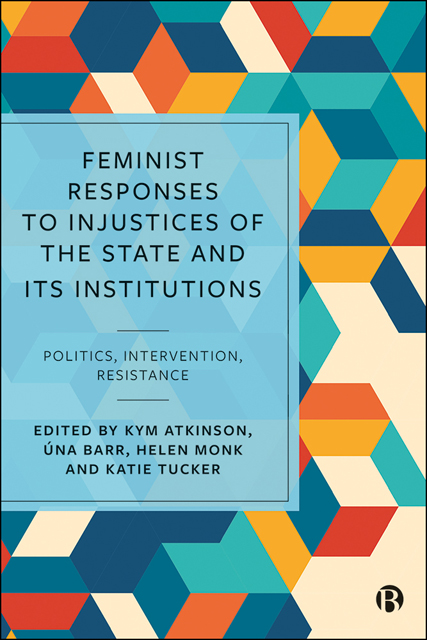 Feminist Responses to Injustices of the State and Its Institutions
Feminist Responses to Injustices of the State and Its Institutions 10 - Traumatizing the Traumatized: Self-Harm and Death in Women’s Prisons in England and Wales
Published online by Cambridge University Press: 17 June 2023
Summary
Introduction
Women who end up in prison are among the most powerless and disadvantaged in our society, largely due to traumatic life experiences such as sexual and physical abuse, mental and physical ill health, racism and discrimination, underpinned by poverty and inequality.
(INQUEST, 2019)
The dominant discourses surrounding self-harm and death in women’s prisons, disseminated through an interlinking, deeply patriarchal, network of state, media, liberal reform groups and academic power structures, have socially constructed a particular ‘truth’ through portraying these profoundly social phenomena in individualistic, pathological terms either as a ‘cry for help’, a result of ‘unfortunate’ bureaucratic failure or a combination of both. This chapter is concerned with utilizing feminist methodology and theory to critique this dominant ‘truth’ and to illustrate how such apparently ‘deviant’ behaviour can be understood not as a cry for help but as a rage against the specific pain that women prisoners experience through being exposed to psychologically withering prison regimes. These regimes reflect, reinforce and reproduce the decimating experiences that the majority of women in prison also encounter on the outside.
The chapter is divided into four parts. First, it provides a critical overview of the data concerning self-harm and deaths in women’s prisons. Second, it considers how a feminist epistemology, built on ‘feminist praxis’, can be used to ‘unsilence’ the voices of women in prison, and their families, and place their experiences directly at the centre of knowledge production (Stanley, 1990). This praxis is not simply about focusing on what kind of knowledge is being produced but, crucially, Stanley asks, what is this knowledge for? For her, ‘[s] uccinctly the point is to change the world, not only to study it’ (Stanley, 1990: 15). Third, it develops a feminist, theoretical perspective in order to critically conceptualize the nature of life and death in women’s prisons. Finally, the chapter outlines a number of feminist-based strategies and interventions for the prevention and elimination of self-harm and deaths in prisons. These strategies can also contribute to the radical transformation in, and eventual abolition of, a pain-inducing institution which has been endlessly critiqued for its abject failure to live up to its own self-serving rhetoric for the last 200 years (Foucault, 1979).
- Type
- Chapter
- Information
- Feminist Responses to Injustices of the State and Its InstitutionsPolitics, Intervention, Resistance, pp. 199 - 215Publisher: Bristol University PressPrint publication year: 2022


